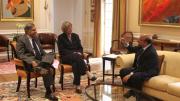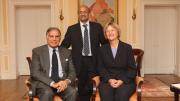Harvard Business School (HBS) today announced receipt of a $50-million gift to fund a new building on its campus for executive education. At the same time, the University announced that it would convert one of the buildings it owns in Allston—the former WGBH facility on Western Avenue—into a Harvard Innovation Lab, meant to involve HBS, the School of Engineering and Applied Sciences (SEAS), students from throughout Harvard, and ultimately the surrounding community in entrepreneurship and the growth of small business ventures. Together, the new and renovated facilities signal changing approaches to campus growth and the ultimate plans for development in Allston.
Tata Hall, A New Center for Executive Education
The executive-education facility, expected to cost $90 million to $100 million, will be significantly underwritten by the gift from Tata Companies, the Sir Dorabji Tata Trust, and the Tata Education and Development Trust, philanthropic entities of India's Tata Group. The Tata conglomerate owns 28 public companies with a combined market capitalization of $80 billion, according to the HBS news release; it is perhaps best known outside India for the $2,000 Tata Nano minicar. Ratan Tata, chairman of Tata Sons Ltd. since 1991, attended HBS's Advanced Management Program (AMP), a core part of the school's executive-education programs, in 1975. (The AMP program, launched in 1945, was the first such executive-education program worldwide, according to HBS.) The Tata Group owns the Taj Hotel in Boston, adding a business connection to Ratan Tata's educational ties to the city. The gift, the largest from an international donor in HBS history, expands HBS's capacity to offer campus-based executive education; overall, executive-education tuition generated $107 million in revenue in fiscal year 2009, according to HBS's annual report—nearly one-quarter of total revenues, and in fact substantially more than tuition and fees for the flagship M.B.A. program.
The new facility, on which HBS hopes to break ground next spring, is to be sited on the open area to the east of Kresge Hall, near Soldiers Field Road. As such, it will be adjacent to the first executive-education residence, Baker Hall, opened in 1970 (72,800 square feet), and McArthur Hall, opened in 1999 (96,000 square feet).
The site, which HBS had long considered for various executive-education expansions, also figured prominently in University planning for Allston campus development overall: it is at the end of Weeks Memorial Bridge, the principal footpath across the Charles River linking the Cambridge campus and HBS, and so was the logical corridor for much-enhanced transportation for any enlarged, integrated campus of the future. And in 2005 Cooper, Robertson & Partners drew up plans for the University that identified the area as a strong candidate for building new undergraduate residential Houses (see this Harvard Magazine report for illustrations of the possible Houses). Proceeding with construction of executive-education facilities here indicates that HBS's campus plans can be pursued in a manner that makes obvious sense for its current and prospective activities, while also making clear that the conceptual plans for Allston campus development are indeed subject to wholesale revision, beyond the construction stoppage on the Allston science complex and the rethinking of University ambitions there that was previously announced (see President Drew Faust's recent remarks on the subject here).
At the announcement, Tata said:
The Harvard Business School is the preeminent place to be exposed to the world’s best thinking on management and leadership, and we are pleased that this gift will support the School’s educational mission to mold the next generation of global business leaders.
President Faust noted:
Ratan Tata knows firsthand the transformative educational opportunities offered through Harvard Business School’s Executive Education programs. Thanks to this generous gift, HBS will be able to expand its already robust offerings in Executive Education, deepening ties with leaders across the country and around the globe.
Nitin Nohria, dean of the Business School, said, “This is an historic gift from a renowned organization revered for its significant economic, civic, and philanthropic impact. The Tata Group is widely respected for integrity and innovation, not just in India…but in a variety of business lines across several continents, from cars to hotels and from tea to information technology." Mayor Thomas M. Menino of Boston, who has had a keen interest in seeing Allston development proceed, added, “Mr. Tata’s gift will create jobs right here in Boston, and the executives who study at HBS will go out into the world as ambassadors of our truly world-class city.”
In a news conference (attended by Menino, Nohria, and Tata) at Kresge Hall, looking out over the lawn where the new building will be sited, Nohria spoke of his own ties to today's events. Two weeks ago, he moved his family from Lexington into HBS's dean's residence, making him the first dean to live on campus in four decades. (And yes, he assured the mayor, he had registered to vote.) And he recalled his own youth in India where, at the time, business ethics were suspect but the Tata enterprises stood for "integrity and quality." Having subsequently come to Boston as a student 26 years ago, he had never left.
Tata recalled coming to the campus many years ago, as a "much younger, much less confident individual. I owe a great deal to HBS," he continued: although he left the campus "confused" and not yet knowing what he had learned, those lessons became clearer later, "at many hard moments in my subsequent career." Menino hailed the announcements as representing significant investments in Boston, with near-term implications for employment and economic momentum," and for their longer-term effects as well.
The executive-education project, Nohria said, is fully funded: the remaining $40 million to $50 million required is available in HBS reserves and other gifts already secured. If approvals are forthcoming, the building could be open by the summer or fall of 2013.
The Tata gift is the second major instance of philanthropic support for the University in recent weeks emanating from an India-based industrial family with strong Harvard ties. On October 4, Anand Mahindra '77, M.B.A. '81, made a $10-million gift to endow the Humanities Center.
HBS's expansion comes at a time of recent large investments in business education. Private-equity investor Henry R. Kravis recently pledged $100 million to Columbia Business School for a building on its new campus; and Yale is constructing an entirely new, Norman Foster-designed campus for its relatively young School of Organization and Management.
Harvard Innovation Lab
According to a simultaneous announcement, the WGBH building, at 125 Western Avenue, will be reopened next fall as an innovation and entrepreneurship incubator space. HBS will fund and develop the lab, while making the facility available to the University and the wider community. Dean Nohria said:
We see it as a potentially quite distinctive resource—not one that would attempt to replicate other successful innovation spaces in Massachusetts, but one that would leverage Harvard’s people and resources in new and exciting ways. Our goal is to drive innovation by connecting entrepreneurial teams, not only across the Charles River, but nationally and internationally, in an interdisciplinary approach to creating viable business ventures and social initiatives.
The facility was proposed by Peter Tufano, Coleman professor of financial management at HBS, according to the University news release. He is a co-chair of the Allston Work Team, a three-person leadership group who, together with 10 deans and others, are charged with advising President Faust on alternatives for developing the area for campus use and related business or nonprofit/institutional facilities.
According to the news release, the lab will initially be open to student entrepreneurs from throughout the University; they will have shared work spaces, access to consulting entrepreneurs in residence, and other support services. The students may be working independently, or in conjunction with courses, such as the joint HBS-SEAS "Inventing Breakthroughs and Commercializing Science," which enrolls students from several Harvard schools as well as MIT and Tufts. Teams competing in the annual HBS Business Plan Contest would also have access to the lab's facilities and resources. Stage two of the lab operations will extend to small businesses and entrepreneurs in the community.
Nohria said the building, currently roofless and vandalized—its copper piping has been stolen, for instance—will require an estimated $15 million to $20 million investment, and that those funds, too, are in hand. Mayor Menino happily cited this evidence of the "University's commitment to reactivating Western Avenue." (The nearby Allston science center construction site is now silent, screened by new fencing and plantings.)
Menino, noting Boston's history and strength as an innovation center, said in the statement, “Harvard is an important part of that history and their investment in this facility in Allston will ensure that they play an important role in the future of innovation in Boston.” Faust, observing that students and faculty are widely interested in entrepreneurship, said, "This lab will foster team-based activities and deepen interactions among both aspiring and experienced innovators across the schools of Harvard.” And SEAS Dean Cherry Murray commented, “Innovation isn’t bounded by organizational structures and areas of study. I’m thrilled to broaden the experience of SEAS students by bringing them together with their counterparts from other fields such as design, business, government, law, medicine, and science.”
From his vantage point outside the United States, Tata said that the U.S. economy was recovering more quickly than those of Europe or the United Kingdom. Today's twin announcements underscored his feeling, he said, that during the depths of the recession and financial crisis, Boston's intellectual capital "may have been subdued, but I don't for a minute think that it had died."









